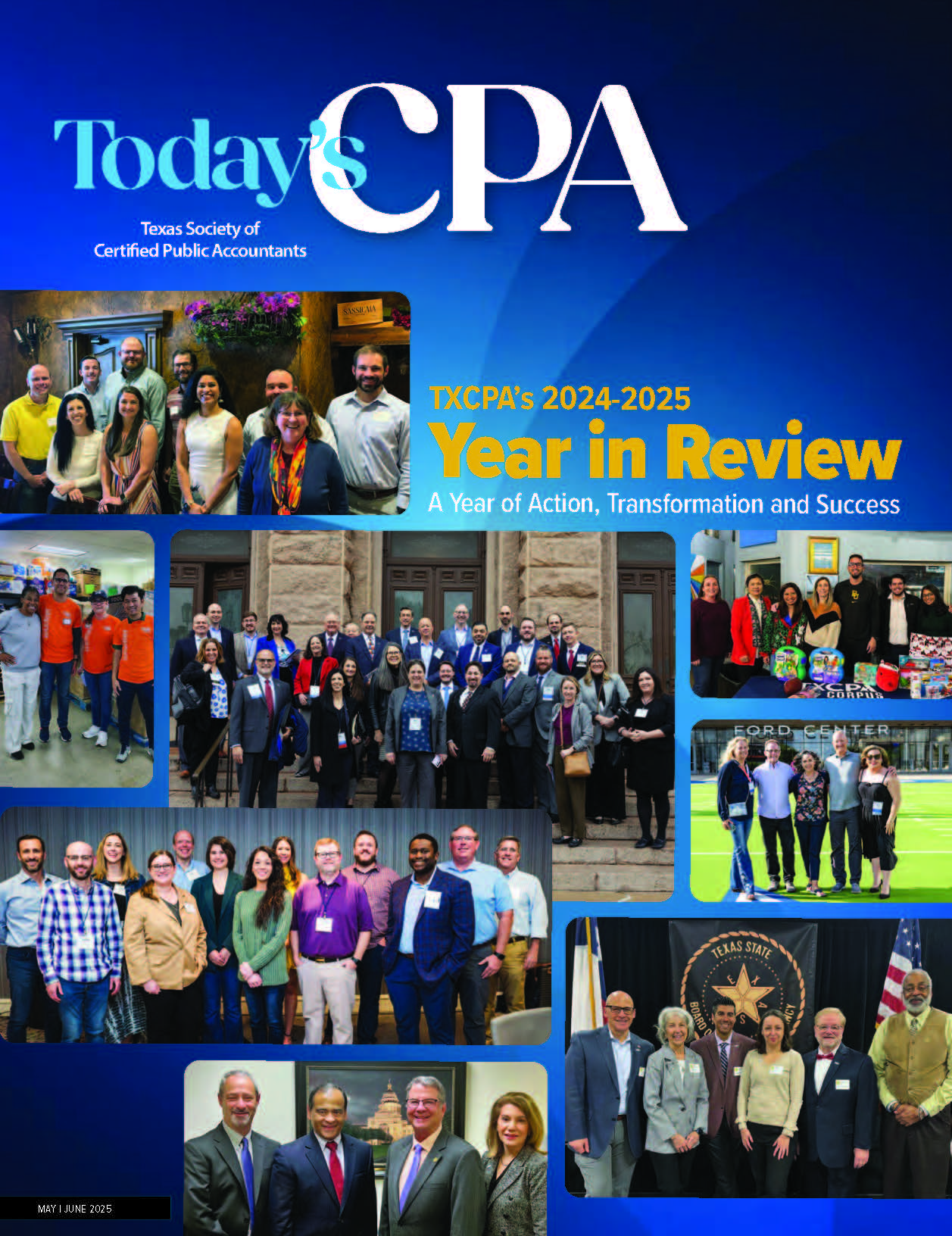June 11, 2025
Key Considerations for Financial Statement Auditors Before Leveraging Artificial Intelligence in Their Audits
By Angel Rafael Otero, Ph.D., CPA, CFE, CISA, CITP, CRISC, CICA
Technology is continuously advancing, yet the concept of artificial intelligence (AI) has consistently captivated people's interest. AI systems are trained to recognize data patterns, make predictions and perform tasks commonly associated with human intelligence1.
Generative AI, a subset of AI, utilizes deep learning models to create human-like content in response to diverse and complex prompts2. ChatGPT, a generative AI model, was introduced in 2022 as ChatGPT 3.5, a free version developed by the OpenAI nonprofit research organization. ChatGPT 3.5 (hereafter referred to as ChatGPT) is designed to engage in and refine natural language conversations, adapting to specified lengths, levels of detail, styles, and languages3.
ChatGPT is among several advanced generative AI tools introduced in recent years, alongside comparable technologies such as Google's Gemini and Microsoft Copilot4. Gemini is noted for its strength in bidirectional training for language comprehension, while Copilot offers features like information retrieval, text generation (e.g., emails and summaries) and image creation from text prompts. Recent research emphasizes ChatGPT's exceptional ability to produce human-like text, attributed to its extensive training data and transformer-based architecture5.
Amid these unprecedented technological advancements, auditors continuously seek to adopt these new AI models to enhance the efficiency of the financial audit process6. Financial statement audits may be conducted by external auditors or internal auditors. Both external auditors and internal auditors recognize the importance of integrating innovative solutions, such as AI, to increase the effectiveness of their audits7.
Advantages of AI’s ChatGPT in Financial Statement Audits
ChatGPT enhances financial audits by improving data analysis, risk detection, regulatory adaptability, predictive insights, automation, and cost efficiency.
Data Analytics and Processing
In financial statement audits, the volume of data to be analyzed can be overwhelming. Traditional methods to analyze these extensive datasets are time-consuming and prone to errors8.
ChatGPT allows both external auditors and internal auditors to navigate through massive datasets, extract relevant information and identify patterns with remarkable speed and accuracy, ultimately enhancing the auditor’s understanding of potential risk patterns or scenarios9. Access to this type of information can be advantageous, especially when it is used in risk assessments or audit procedures like testing automated controls.
Continuous Learning and Adaptability
Continuous learning, when related to AI, can revolutionize the financial statement audit process by enabling machine learning algorithms to evolve and enhance their understanding of complex financial data patterns over time10. This characteristic empowers ChatGPT to discern subtle anomalies, outliers and nuanced trends that may elude a human auditors’ scrutiny11.
Furthermore, ChatGPT could learn to recognize subtle indicators of revenue manipulation by continuously analyzing transaction patterns, seasonal trends and industry benchmarks.
The adaptive capabilities of ChatGPT make it a valuable asset for organizations navigating the ever-changing landscape of regulatory requirements in financial statement audits12. ChatGPT can quickly adapt and incorporate changes in regulations into its understanding, ensuring alignment with the latest audit regulatory requirements. By leveraging ChatGPT, organizations can streamline their compliance processes and effectively incorporate new regulations into their financial auditing practices13.
Predictive Analytics
Predictive analytics allow external auditors and internal auditors to validate historical financial information and obtain understanding of the potential trajectory of an organization’s financial performance. Forecasting financial trends, for example, is a prime application of predictive analytics in internal audits14.
ChatGPT can analyze historical financial data and discern patterns that may not be immediately apparent15. By using ChatGPT to project these patterns into the future, auditors can gain a better understanding of an organization’s financial performance.
Audit Efficiencies
ChatGPT can generate significant efficiencies by automating routine tasks like data extraction, data analysis and document review16. Using ChatGPT in financial statement audits can provide auditors with new skills and abilities to improve existing audit procedures like generating faster and high-quality work papers and performing consistent automated testing of financial transactions17. ChatGPT can also quickly analyze significant amounts of financial data, identify patterns, and flag discrepancies or anomalies that require further investigation18.
Cost Savings
ChatGPT provides cost savings by automating workflows and tasks, such as data entry, reconciliation and basic analyses19. Additionally, ChatGPT can streamline the identification of discrepancies and trends, decreasing the time and resources spent on manual reviews20.
Disadvantages of AI’s ChatGPT in Financial Statement Audits
There are also concerns to be considered when using ChatGPT.
Data Security and Privacy Concerns
Integrating ChatGPT into financial statement audits raises significant concerns about data security and privacy21. A major security concern stems from the cloud-based nature of ChatGPT. Although auditors have their own policies prohibiting client/organization data from being stored on the cloud, these policies may not always be followed22.
The above may result in client/organization data being stored on third-party servers, exposing sensitive financial information and potentially causing financial harm. ChatGPT could also inadvertently expose private data to unauthorized parties, especially if security measures are not implemented.
Training Data Bias
ChatGPT’s trained data may contain biases leading to the reinforcement of prejudices or spread of misinformation23. To ensure unbiased interactions, careful data curation during training and ongoing monitoring are essential.
Addressing training data bias is a complex challenge in financial statement audits and thus requires careful curation of diverse and representative datasets. Both external auditors and internal auditors should conduct thorough assessments to identify and rectify any underlying biases in the data used to train ChatGPT.
Limited Understanding of Regulations
As we know, the landscape of financial regulations is dynamic, calling for frequent updates and changes. Consequently, integrating ChatGPT into financial statement audits poses a challenge in ensuring that the platform stays abreast of the latest regulatory developments.
Unlike human auditors, ChatGPT lacks the inherent ability to track and understand evolving financial regulations. This limitation can lead to compliance risks, as outdated or incomplete generated information may be relied upon when utilizing ChatGPT for regulatory compliance assessments.
Inability to Verify Source Data
Auditors rely on the accuracy and reliability of the data used in financial statement audits to draw meaningful conclusions. Nonetheless, ChatGPT cannot verify or ensure the accuracy or integrity of source information, posing a notable challenge in financial audits.
The inability to cross-check and validate original sources in an audit could result in the acceptance of erroneous financial data or overlooking critical discrepancies. This lack of verification undermines the audit's integrity, causing auditors to base their decisions on incomplete or misleading data, thereby increasing the risk of financial misstatements and compliance issues.
The Role of AI in Financial Statement Audits
The integration of ChatGPT in financial statement audits marks a major turning point in the trajectory of traditional auditing practices. Successfully using ChatGPT in financial statement audits depends on a close partnership between human auditors and AI as they work together in this intricate process.
Even with the drawbacks mentioned in this article, the efficiency and time-saving gains from utilizing ChatGPT in financial statement audits may ultimately compel auditors to increasingly rely on this technology in the completion of their audits.
Summary of Advantages and Disadvantages to Consider
Advantages:
- Efficiency and Accuracy – Speeds up data processing, risk assessment and compliance
- Predictive Analytics – Helps forecast financial trends
- Cost Savings – Reduces manual workload and expenses
Disadvantages:
- Security and Privacy Risks – Potential data exposure
- Bias and Regulatory Limits – AI may reinforce biases and struggle with evolving regulations
- Verification Issues – Cannot independently confirm data accuracy
About the Author: Angel Rafael Otero, Ph.D., CPA, CFE, CISA, CITP, CRISC, CICA, is Associate Professor of Accounting Information Systems and Academic Chair for Accounting and Finance Online Programs in the Nathan M. Bisk College of Business at the Florida Institute of Technology. Contact him at aotero@fit.edu.

Footnotes
1. Gao, X., & Feng, H. (2023). AI-driven productivity gains: AI and firm productivity. Sustainability, 15(11), 8934.
2. 4. Luna, J. C. (2024). The Top 10 ChatGPT Alternatives You Can Try Today. Datacamp. https://www.datacamp.com/blog/10-chatgpt-alternatives
3. Marr, B. (2023). A short history of ChatGPT: How we got to where we are today. Forbes. https://www.forbes.com/sites/bernardmarr/2023/05/19/a-short-history-of-chatgpt-how-we-got-to-where-we-are-today/?sh=7c107750674f
5. Aydin, Ö., & Karaarslan, E. (2023). Is ChatGPT Leading Generative AI? What is Beyond Expectations? Academic Platform Journal of Engineering and Smart Systems, 11(3), 118-134. doi: 10.21541/apjess.1293702. Chu, M. -N. (2023). Assessing the Benefits of ChatGPT for Business: An Empirical Study on Organizational Performance. IEEE Access, 11(1), 76427-76436. doi: 10.1109/ACCESS.2023.3297447.
6. Otero, A. R. (2015). Impact of IT auditors’ involvement in financial audits. International Journal of Research in Business and Technology, 6(3), 841-849.
7. Almufadda, G., & Almezeini, N. A. (2022). Artificial intelligence applications in the auditing profession: A literature review. Journal of Emerging Technologies in Accounting, 19(2), 29-42. Otero, A. R. (2018). System Development Life Cycle. In A. R. Otero (Ed.), Information Technology Control and Audit (5th ed., pp. 201-236). Boca Raton, FL. CRC Press and Auerbach Publications. ISBN #: 9781498752282
8. 17. Fedyk, A., Hodson, J., Khimich, N., & Fedyk, T. (2022). Is AI improving the audit process? Review of Accounting Studies, 27(1), 938-985.
9. 16. Almufadda, G., & Almezeini, N. A. (2022). Artificial intelligence applications in the auditing profession: A literature review. Journal of Emerging Technologies in Accounting, 19(2), 29-42.
10. 11. 18. Dong, M. M., Stratopoulos, T. C., & Wang, V. X. (2023). A Scoping Review of ChatGPT Research in Accounting and Finance. (December 30, 2023). (Working paper). http://dx.doi.org/10.2139/ssrn.4680203
12. Hacker, B. (2023). Will ChatGPT revolutionize accounting? The benefits of AI in accounting. ECONSTOR. https://www.econstor.eu/bitstream/10419/273360/1/1851793127.pdf
13. Deloitte. (2010). Continuous monitoring and continuous auditing – From idea to Implementation. Deloitte. https://www2.deloitte.com/content/dam/Deloitte/us/Documents/audit/us-aers-continuous-monitoring-and-continuous-auditing-whitepaper-102910.pdf
14. 20. Eulerich, M., & Wood, D. A. (2023). A Demonstration of How ChatGPT Can be Used in the Internal Auditing Process. (Working paper). http://dx.doi.org/10.2139/ssrn.4519583
19. Emett, S. A., Eulerich, M., Lipinski, E., Prien, N., & Wood, D. A. (2023). Leveraging ChatGPT for Enhancing the Internal Audit Process – A Real-World Example from a Large Multinational Company. (Working paper). http://dx.doi.org/10.2139/ssrn.4514238
21. Alshurafat, H. (2023). The usefulness and challenges of chatbots for accounting professionals: Application on ChatGPT. (Working paper). https://papers.ssrn.com/sol3/papers.cfm?abstract_id=4345921
22. Silvius, A.J.G., & Dols, T. (2012). Factors influencing Non-Compliance behavior towards Information Security Policies. CONF-IRM 2012 Proceedings. 39. https://aisel.aisnet.org/confirm2012/39
23. Kalla, D., & Smith, N. (2023). Study and analysis of ChatGPT and its impact on different fields of study. International Journal of Innovative Science and Research Technology, 8(3), 827-833.
Thanks to the Sponsors of Today's CPA Magazine
This content was made possible by the sponsors of this issue of Today's CPA Magazine:






















